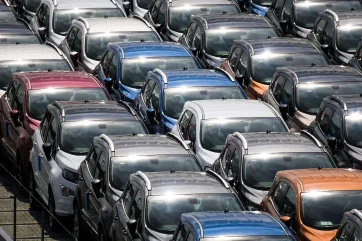
UK new car registrations rose by 1.1% year-on-year in June.
The Society of Motor Manufacturers and Traders (SMMT) said that this market growth was still, as in recent months, being mainly driven by fleet registrations, which were up by 14.2%.
Business registrations – classed as those to fleets with fewer than 25 vehicles – were up by 22%, while private registrations were down by 15.3% for the ninth consecutive month of decline.
Fleets are also driving EV registrations, which were up by 7.4% year-on-year in June for a 19% new car market share, with the SMMT saying fewer than one in five of these went to private buyers.
Plug-in hybrid registrations were up by 30%, accounting for 9.3% of the market, while conventional hybrids were up by 27.2% for a 14.9% market share.
Petrol car registrations were down by 7.8%, taking 50.9% of all sales, while diesels were down by 17.2% to account for 6% of the market.
For the year to date, the overall market has now passed one million registrations. The SMMT said it was the first time this milestone had been reached this early since 2019.
SMMT chief executive Mike Hawes said: “The year’s midpoint sees the new car market in its best state since 2021 – but this belies the bigger challenge ahead.
“The private consumer market continues to shrink against a difficult economic backdrop, but with the right policies in place, the next government can re-energise the market and deliver a faster, fairer zero emission transition.
“All parties are agreed on the need to cut carbon and replacing older fossil fuel based technologies with new electrified powertrains is the essential step to achieving that goal.”
Reacting to the figures, KPMG UK head of automotive Richard Peberdy said: “New car sales are above levels seen this time last year, with fleets continuing to be the driver of growth in the market.
“The industry has its eyes firmly on the outcome of the election and what that means for automotive policy and attracting continued and further investment over the coming years.
“Increasing new electric vehicle sales is imperative to UK car makers, who are now mandated to ensure that annually increasing percentages of the cars that they manufacture are electric.
“Increasingly players in the industry are talking about how this is best achieved, including the likes of increased incentives for consumer purchases of new EVs. Incentivising businesses to make new EV purchases has been a key contributor to growing UK EV sales in recent years.”
Novuna Vehicle Solutions managing director Jon Lawes said: “Businesses need stability and confidence if they are to plan for long-term investment. With the UK heading to the polls, it’s vital the election ends this period of uncertainty on transition goals and provides cast iron EV adoption deadlines.
“There is a long road ahead. Consumers considering the EV switch are contending with affordability hurdles and a dearth of charging infrastructure. Whoever forms the next government urgently needs to adopt a bold strategy to mobilise policy incentives and deploy infrastructure investment.”





